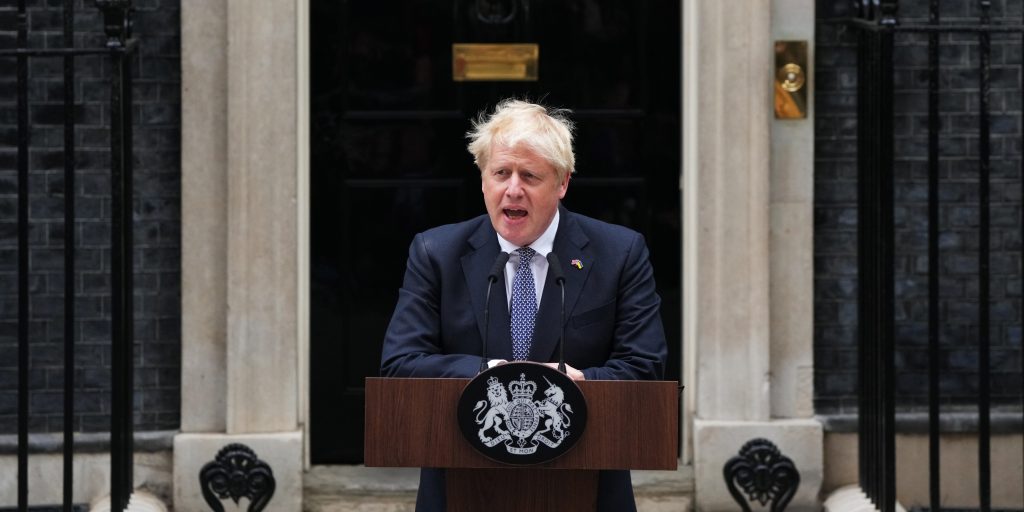- Boris Johnson resigned Thursday, setting the stage for a leadership contest among Tory MPs.
- Johnson favors a transition that leaves him in office to October, but could be forced to go faster.
- Sources told Insider that the process could conclude in time for a new prime minister by August.
UK Prime Minister Boris Johnson said Thursday it was "clearly the will" of the Conservative party to find a new leader, and that the process to decide a replacement "should begin now".
He might not have said the word "resign" but after a bruising week of ministerial resignations, he has at last kicked off the race to find his successor.
So what happens next?
When will Boris Johnson leave Downing Street?
Speaking to Sky News, a close ally of Johnson, James Duddridge, said the Prime Minister that "will not be there by party conference" in early October, but avoided giving a specific date.
Johnson also gave no date in his speech. A government source earlier told Insider that Johnson intended to stay in place right up to the October conference, but that ambition has not been repeated since.
Some MPs were initially supportive of the idea, but senior Tories spoke out against the idea of such a long transition.
Sir John Major, the former Conservative prime minister, wrote the Sir Graham Brady, the MP who oversees the group of Conservatives in charge of leadership elections, to say that timeline was "unwise, and may be unsustainable".
Ruth Davidson, the former Scottish Conservative leader, said: "There's no way he can stay on until October. It's arrant nonsense to think he can."
The decision ultimately rests not with Johnson but with the leaders of the 1922 Committee, which Brady chairs.
What is the timeline for the leadership contest?
Two Tory MPs told Insider that things could move pretty quickly from the Thursday resignation.
The 1922 Committee brought forward a vote to form a new executive committee, which is now due to happen on Monday July 11.
The MPs — who requested anonymity to speak frankly — said the vote this would likely usher in a group tilted in favour of Johnson's rapid departure.
The first vote in a leadership contest could take place as early as next week, the MPs said, with candidates being whittled down to the final two in time for Parliament's recess to begin on July 21.
Under Conservative Party rules, ordinary members choose between the final two candidates in a vote, which could take place over the recess and conclude in time for a new Prime Minister by the end of August.
How is a new leader elected?
Conservative MPs who want to be considered need to tell the 1922 Committee, which will set a deadline for applications.
Some prominent MPs have already ruled themselves out, including Matt Hancock, the former Health Secretary who resigned over an affair; Dominic Raab, who is Johnson's deputy; and Michael Gove, a senior minister who was sacked on Wednesday.
—John Stevens (@johnestevens) July 7, 2022
But plenty of others have been courting MPs for some time anticipating a leadership election on Johnson's departure.
Tory backbenchers — who also asked not to be named to describe the lobbying frankly — told Insider they expected Penny Mordaunt, Rishi Sunak and Sajid Javid to fare well.
Sunak and Javid were in Johnson's cabinet as Chancellor and Health Secretary respectively until Tuesday.
Tom Tugendhat, who has never held a ministerial position, is seen as a wildcard, but has the backing of a significant number of One Nation Tories.
Jeremy Hunt, who came second to Johnson in 2019, has support – but some sources believe it is more likely he will play kingmaker to another "moderate" choice.
Ben Wallace, the Defence Secretary, and Liz Truss, the Foreign Secretary, are also seen as likely candidates.
Under the selection rules, anybody with the support of less than 5% of Tory MPs gets eliminated after the first round. The second eliminates anyone with less than 10%.
After this, rounds of voting continue, with the last-place candidate eliminated each time, until only two remain. Then party members make a final choice.
Will the new ministers remain?
During his speech on Thursday, Johnson said he had appointed a new Cabinet to maintain the functioning of government until his successor arrives.
A new prime minister could keep any of those people in place, but new prime ministers tend to overhaul their top team substantially on taking office.
